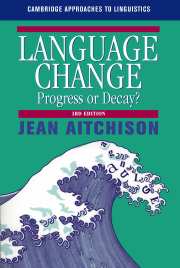Book contents
17 - Progress or decay?
Assessing the situation
from Part 4 - Beginnings and endings
Summary
If you can look into the seeds of time,
And say which grain will grow and which will not …
William Shakespeare, MacbethPredicting the future depends on understanding the present. The majority of self-proclaimed ‘experts’ who argue that language is disintegrating have not considered the complexity of the factors involved in language change. They are giving voice to a purely emotional expression of their hopes and fears.
A closer look at language change has indicated that it is natural, inevitable and continuous, and involves interwoven sociolinguistic and psycholinguistic factors which cannot easily be disentangled from one another. It is triggered by social factors, but these social factors make use of existing cracks and gaps in the language structure. In the circumstances, the true direction of a change is not obvious to a superficial observer. Sometimes alterations are disruptive, as with the increasing loss of t in British English, where the utilization of a natural tendency to alter or omit final consonants may end up destroying a previously stable stop system. At other times, modifications can be viewed as therapy, as in the loss of h in some types of English, which is wiping out an exception in the otherwise symmetrical organization of fricatives.
However, whether changes disrupt the language system, or repair it, the most important point is this: it is in no sense wrong for human language to change, any more than it is wrong for humpback whales to alter their songs every year.
- Type
- Chapter
- Information
- Language ChangeProgress or Decay?, pp. 249 - 260Publisher: Cambridge University PressPrint publication year: 2000

